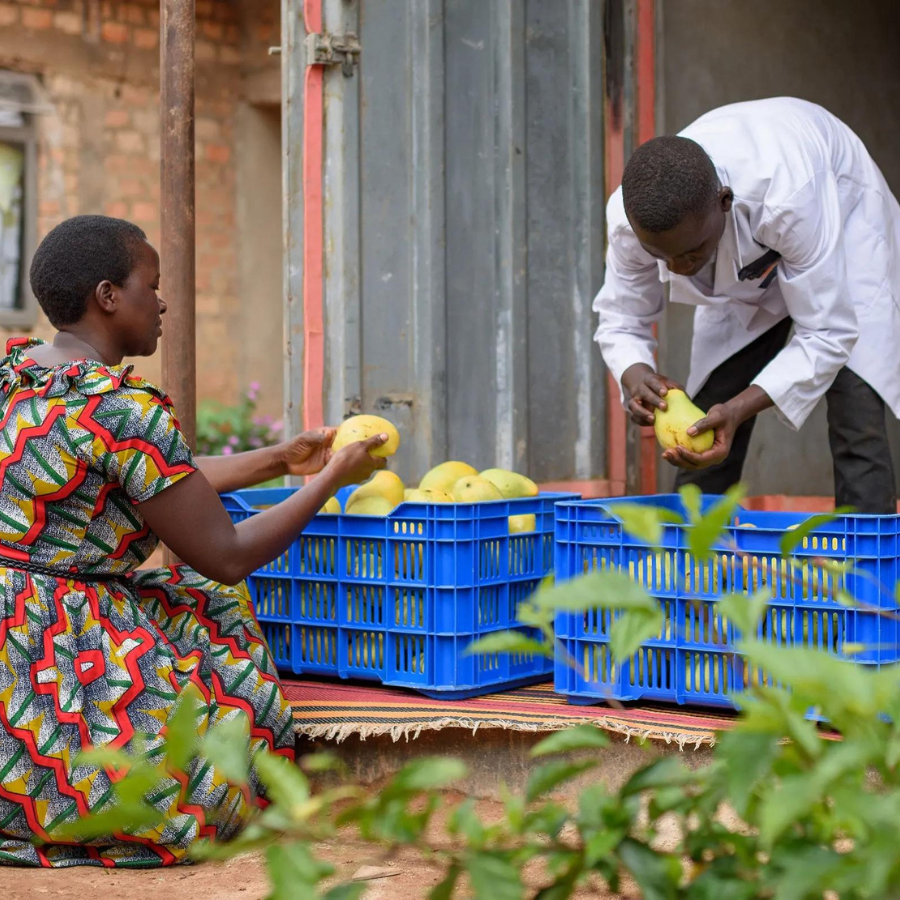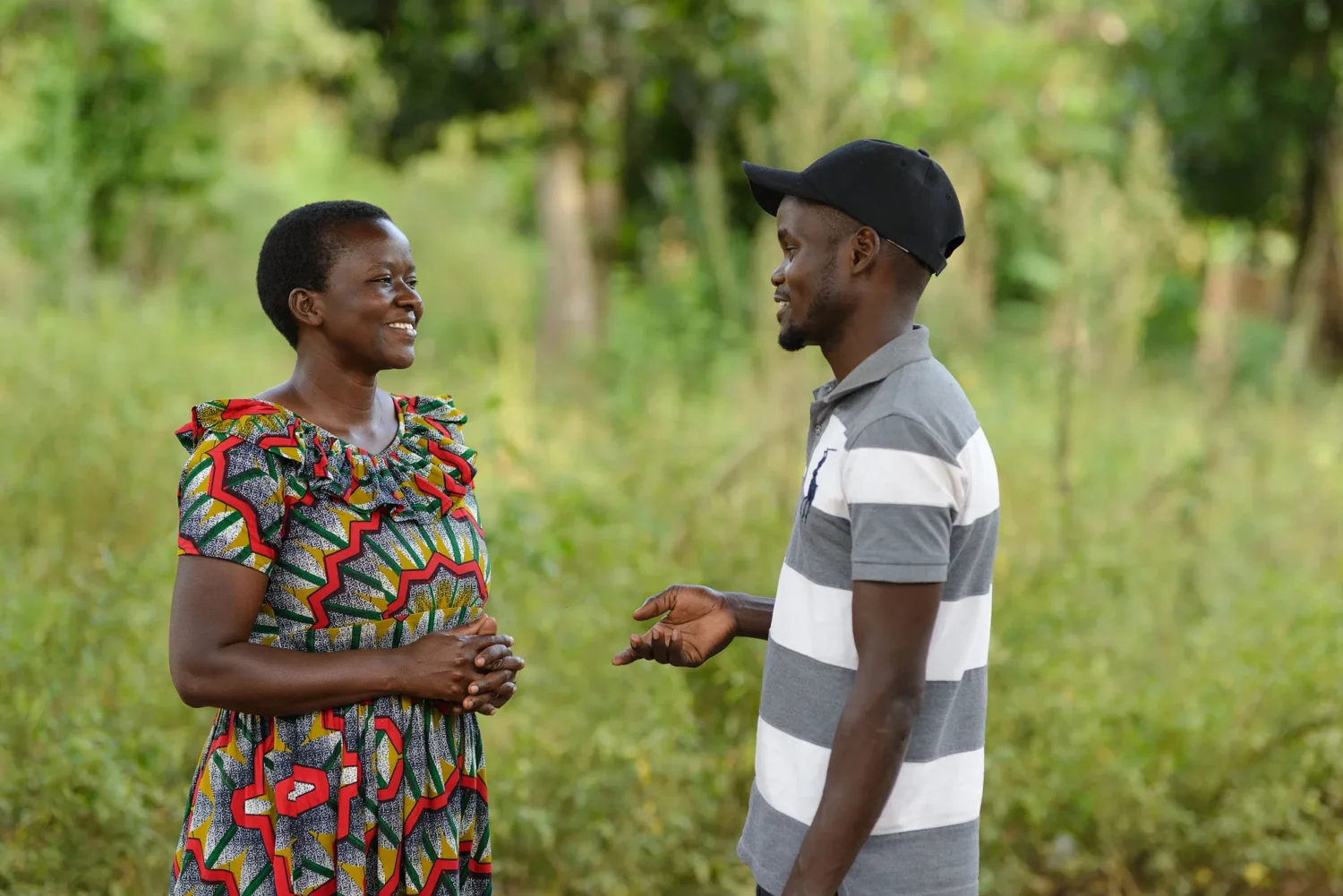Global LEAP Awards Spotlight: Ecolife, Improvisation and Innovation
Ecolife, one of four finalists in the Global LEAP Awards Off-Grid Cold Chain Challenge, provides off-grid cold storage that can keep fruit and vegetables fresh for over a week. This makes for easier transport to cities, better quality produce and, as a result, better prices for producers.

As David Kiyinji knows, it can be hard to make a living through mangoes. Where he lives in Luwero, in central Uganda, the juicy orange fruit seems to be dangling off every tree during the rainy season, a fact that Kiyinji uses to his advantage; he harvests wild mangoes, traveling nearly an hour out of town every morning to an enormous untended tree whose fruit is free for the picking. Scaling the gnarled old trunk, he tosses ripe fruit down to his partner, who scrambles to catch it in a sack. Kiyinji relies on these wild mangoes to make a living, selling them on to market traders.
But this is when things tend to fall apart.
If you go to the market they can pay you any amount they want, he explains. Sometimes my customers take the mangoes on credit, take them without paying. Sometimes they come back and say things didn’t work out, and pay you less than you had agreed upon. When he comes back and gives you less than you expect your plans will die. But Kiyinji doesn’t feel he has much choice. Mangoes go bad in two days in this area, he says.
Working with a highly perishable product makes it difficult for producers like Kiyinji to profit from their labor, a problem that isn’t unique to mangoes. Currently 80 percent of our population is in the farming sector, and every season the farmers lose 50 percent of their produce due to a lack of storage facilities, explains Hadijah Nantambi Ssekyondwa. But through her company, Ecolife, Ssekyondwa plans to tip those numbers in farmers’ favor.
Ecolife, one of four finalists in the Global LEAP Awards Off-Grid Cold Chain Challenge, provides off-grid cold storage that can keep fruit and vegetables fresh for over a week. This makes for easier transport to cities, better quality produce and, as a result, better prices for producers.
Most of the farmers just can’t believe that the produce can stay fresh, laughs Ssekyondwa. In the case of mangoes that you would have sold in two days; with cold storage, you can sell them for two weeks.
In a country whose economy depends so heavily on agriculture, she’s convinced that reducing produce waste is key to boosting rural incomes. If we can save it, that is money coming to the pocket of the trader, coming to the pocket of the farmer, she says.
Ecolife’s pilot project is in Luwero, where Ssekyondwa has built a cold room specifically for mangoes. The location is strategic: sitting directly on the main road linking northern Uganda to the capital, Kampala, the town receives a steady stream of farmers traveling south to sell their wares. But many never make it that far, and this is what Ecolife is hoping to change.
We are looking at the mangoes grown in Luweero, Nakaseke and Lira, and every year they are just wasted, Ssekondywa explains. We are strategically located on this road so that the impact can be here, then later it can be multiplied to other regions in Uganda.
EcoLife uses the cold room to improve the mangoes’ shelf life, which allows them to negotiate higher prices with market traders. This allows Ssekyondwa to pay her own suppliers well, and, crucially, to pay cash upfront.
For local farmers like Kiyinji, this has already made a difference.
Ecolife pays a bit higher, he explains. I have not been cheated like I was in past seasons. I want them to continue to buy from me.
Solar challenges
The cold room itself, with its red brick walls and corrugated metal roof, is nearly indistinguishable from other buildings in the area. But the walls are insulated with tightly packed plastic bottles, and the interior is sealed in smooth cement. At 22 cubic meters, the room was intended to operate with two evaporators, though Ssekyondwa admits they’re only using one at the moment.
The room’s six 100-volt solar panels are connected to four batteries, not enough to keep it cold throughout the day. Ssekyondwa would eventually like the unit to be powered by 30 solar panels and 16 batteries, but in the meantime Ecolife has had to improvise, using a combination of solar power, grid power and a diesel generator to keep temperatures down.
It’s a hybrid system,’ she explains, adding that the poor quality batteries they bought have made it impossible to depend entirely on solar power. Even on sunny days the solar system only provides enough energy for around four hours of cooling; after that, they are forced to turn on the generator.
Ssekyondwa is the first to admit that this isn’t an ideal setup. I know the effects and I really don’t want to continue with that, she insists. We have enough sun, so there is capacity to store enough to run the unit between 18 to 19 hours per day. But high quality batteries are prohibitively expensive in Uganda, and keeping construction costs low was crucial to getting the project off the ground. At around 30 million Ugandan shillings ($8,150), Ecolife’s cold room cost about a fifth of what a more high-tech solution would cost to install, putting it just within reach of a young entrepreneur like Ssekyondwa.
We are working with products that currently have a very small profit margin in Uganda, she says, adding that the lack of available funds has created other technical challenges for the young company. Their second-hand compressors tend to break down; the overused batteries wear out more quickly than they should; and instead of buying solar-compatible DC equipment, Ecolife buys AC equipment from the market and re-tools it to work with their system, making the unit considerably less efficient than it could be.


But when it came to the cold room’s insulation, Ssekyondwa found that her cost-saving instincts overlapped neatly with her values.
We used plastic PET bottles, filled them with air and capped them. We have a lot of them in Uganda, and currently the country is burning fuel to transport them to China for recycling. Can’t we do the recycling here? The answer is yes.
An industrial chemist with a master’s degree in technology innovations and industrial development, Ssekyondwa is passionate about sustainable waste management.
With Ecolife we are looking at managing waste, and also producing viable products that can help our communities, she explains. Although simply stacking bottles isn’t the most effective way to insulate a cold room, Ssekyondwa has been collaborating with another company to recycle the plastic into a form of molded insulation that would better keep the precious cold air in.
What inspires me is to innovate technologies that can solve community challenges, and use available resources to create products that can change someone’s life, she says with a smile. We are working with farmers from Luwero, and each time they deliver produce to the cold room there is that excitement on their face: ‘Hey, today I’m delivering my produce and I will be paid. I don’t have to wait the whole night to sell my produce in the market. I don’t have to be bothered that if I harvest all these mangoes, 50 percent of them will be lost.’ That has inspired me a lot.
Trailblazing for female engineers
As a female entrepreneur in a conservative country like Uganda, Ssekyondwa has needed all the inspiration she can get. Although women enjoy more opportunities than they used to, she explains, in terms of science, engineering and technology, they have not been appreciated yet. So it has been hard for people to believe in me. Sometimes you feel so alone along the journey. People don’t believe that it can be done.
This lack of confidence has had financial implications, and raising investment capital from skeptical family members has proven to be one of the company’s biggest challenges. Even today, the cold room suffers from inadequate resources and Ssekyondwa often uses the profits she makes from another branch of Ecolife — a produce delivery service — to subsidise its operating costs.



Still, she dares to dream big, aiming to expand the cold room concept to agricultural collection centers across the country. Someday she would even like to open a greengrocers selling solar-chilled produce.
My dream is to have people come in to buy quality produce and have zero food loss at the store, and later see people eating more nutritious foods, more fruits and vegetables, she says. The farmers will be earning more money, there will be no food loss in the middle, and the consumer can access produce throughout the whole year.
In the meantime Ssekondywa is focused on working out the kinks in her existing unit, and sharing what she and her team have learned with students from local universities. Including student interns in the design process not only allows Ecolife to benefit from their budding expertise, she says, but it also opens their eyes to what’s possible, even in a country like Uganda where materials are scarce.
They have seen it from the infant stage, and they saw how using local materials can help you achieve a working product that can solve a community challenge, grins Ssekondywa. That has inspired them a lot.
That has inspired them a lot, she insists. We know our journey. We know what we have to do right, and we are going to do it right.
***
About the Global LEAP Awards
The Global LEAP Awards is an international competition to identify and promote the world’s best off-grid appliances, accelerating market development and innovation. This unique programme has evolved into a trusted global brand that serves as the de facto source of accurate, actionable information about the quality and energy performance of off-grid appliances, with support from Power Africa, UK aid, Energising Development, Powering Agriculture, and USAID, and in partnership with the Efficiency for Access Coalition which is co-chaired by the IKEA Foundation and UK aid.